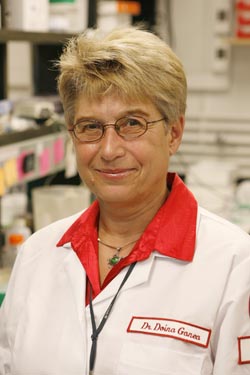School of Medicine names chair of microbiology and immunology
| The School of Medicine has appointed Doina Ganea, Ph.D, as chair of the Department of Microbiology and Immunology. She was previously professor of physiology.
Before coming to Temple, Ganea conducted her research and taught at Rutgers University for more than 15 years as a professor of immunology in the Department of Biological Sciences. She also served as an associate director for the biology graduate program and was a member of the graduate faculty in the Department of Biological Sciences and the graduate program in integrative neuroscience. Ganea joined the faculty in Temple’s Department of Physiology in November 2005. After meeting the faculty and seeing firsthand the various specialties of her future colleagues and the Medical School’s focus on accommodating their research and teaching needs, Ganea said Temple was the right environment for continuing her research programs and developing them through multiple collaborations. |
 Joseph V. Labolito/Temple University
Ganea
|
|
In her new role, Ganea has planned several initiatives to strengthen the department, including recruiting new researchers, fostering interdisciplinary collaboration on new research projects, and growing the Ph.D. program and the teaching program for professional and graduate students. “I am an immunologist by trade,” said Ganea, who earned her Ph.D. in immunology from the University of Illinois at Chicago. “So this was a natural fit.” Ganea’s research, renowned in the field of microbiology and immunology, focuses on what causes the body’s immune system to work overtime; that is, to transition from a normal state of defense into a chronic inflammatory response and the development of autoimmune disorders. Specifically, Ganea looks at rheumatoid arthritis, multiple sclerosis and Crohn’s disease to determine the common mechanisms involved in these very different inflammatory conditions. Her research program has been funded by numerous awards, including current grants from the National Institutes of Health to study whether neuropeptides could become therapeutic agents for treating autoimmune disorders. Ganea has been invited to lecture on her findings at institutions and conferences worldwide. She has served as a member of several professional organizations, including the International Society for Immunology and the American Association for Immunologists. She has authored more than 118 peer-reviewed publications, book chapters and abstracts, and many of her papers are recognized as seminal contributions to her field. |
|